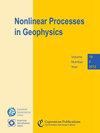Predicting Sea Surface Temperatures with Coupled Reservoir Computers
IF 1.7
4区 地球科学
Q3 GEOSCIENCES, MULTIDISCIPLINARY
引用次数: 5
Abstract
Abstract. Sea surface temperature (SST) is a key factor in understanding the greater climate of the Earth and is an important variable when making weather predictions. Methods of machine learning have become ever more present and important in data-driven science and engineering including in important areas for Earth Science. We propose here an efficient framework that allows us to make global SST forecasts by use of a coupled reservoir computer method that we have specialized to this domain allowing for template regions that accommodate irregular coastlines. Reservoir computing is an especially good method for forecasting spatiotemporally complex dynamical systems, as it is a machine learning method that despite many randomly selected weights, it is nonetheless highly accurate and easy to train. Our approach provides the benefit of a simple and computationally efficient model that is able to predict sea surface temperatures across the entire Earth’s oceans. The results are demonstrated to replicate the actual dynamics of the system over a forecasting period of several weeks.用耦合油藏计算机预测海面温度
摘要海表温度(SST)是了解地球大气候的一个关键因素,也是天气预报时的一个重要变量。机器学习方法在数据驱动的科学和工程中变得越来越普遍和重要,包括在地球科学的重要领域。我们在这里提出了一个有效的框架,使我们能够通过使用我们专门用于该领域的耦合水库计算机方法来进行全球海温预报,该方法允许模板区域容纳不规则的海岸线。油藏计算是预测时空复杂动力系统的一种特别好的方法,因为它是一种机器学习方法,尽管有许多随机选择的权重,但它仍然是高度准确且易于训练的。我们的方法提供了一个简单且计算效率高的模型,能够预测整个地球海洋的海面温度。结果被证明可以在几个星期的预测期内复制系统的实际动态。
本文章由计算机程序翻译,如有差异,请以英文原文为准。
求助全文
约1分钟内获得全文
求助全文
来源期刊

Nonlinear Processes in Geophysics
地学-地球化学与地球物理
CiteScore
4.00
自引率
0.00%
发文量
21
审稿时长
6-12 weeks
期刊介绍:
Nonlinear Processes in Geophysics (NPG) is an international, inter-/trans-disciplinary, non-profit journal devoted to breaking the deadlocks often faced by standard approaches in Earth and space sciences. It therefore solicits disruptive and innovative concepts and methodologies, as well as original applications of these to address the ubiquitous complexity in geoscience systems, and in interacting social and biological systems. Such systems are nonlinear, with responses strongly non-proportional to perturbations, and show an associated extreme variability across scales.
 求助内容:
求助内容: 应助结果提醒方式:
应助结果提醒方式:


